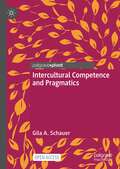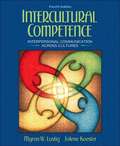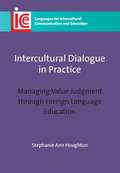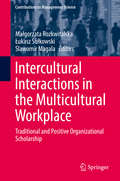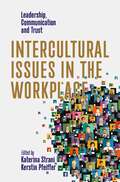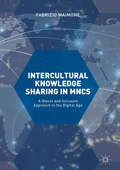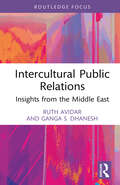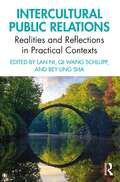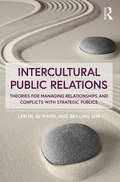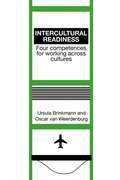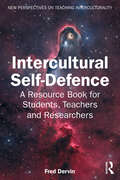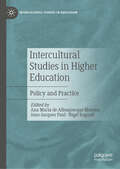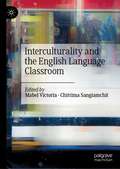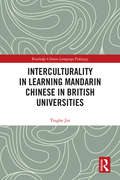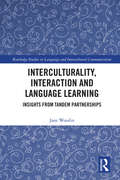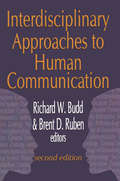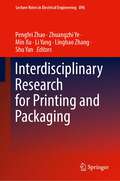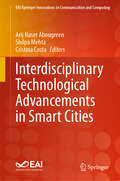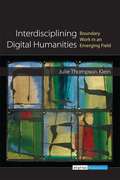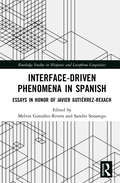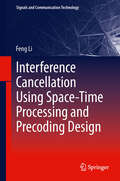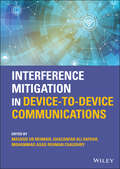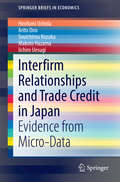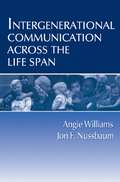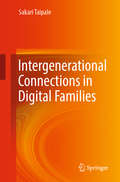- Table View
- List View
Intercultural Competence and Pragmatics
by Gila A. SchauerThis Open Access book examines the link between intercultural competence (IC) and pragmatics by asking frontline modern foreign language teachers in higher education teaching a variety of languages (e.g., Dutch, English, French, German, Italian, Spanish, Swedish) how they conceptualise intercultural competence and which skills, competences and knowledge they consider important in their teaching contexts. The data were collected with an online survey that focused on the relationship between intercultural competence and pragmatics.While international organizations such as the United Nations Educational, Scientific and Cultural Organization (UNESCO) or the Council of Europe (CoE) agree that intercultural competence should play an important role in education, it is not always clear what IC may encompass in specific teaching contexts and subject areas. Examining how modern foreign language teachers in higher education conceptualise intercultural competence and the value they attach as well as the attention they give to various areas of pragmatics in their teaching is highly important, since those language professionals may be the final teachers learners encounter during their formal foreign language education. They are therefore in a unique position to shape modern foreign language learners’ intercultural and pragmatic awareness, competence and skills.This book will be of interest to language professionals, modern foreign language teachers and teacher trainers, as well as students and scholars of applied linguistics, pragmatics, and language education.
Intercultural Competence--Interpersonal Communication across Cultures
by Myron W. Lustig Jolene KoesterIn all of your personal and professional endeavors, you must learn to communicate with people whose cultural heritage makes them vastly different from you.
Intercultural Dialogue in Practice
by Stephanie Ann HoughtonThe term intercultural dialogue has become a buzzword at policy level, but there is a pressing need to synchronise the terminology of policymakers with that of academics. An overarching aim of this book is to explore the wide-ranging terminology relevant to intercultural dialogue in order to promote clearer consideration of the underlying issues. More specifically, this book reports the findings of a research project conducted in Japan that brought teaching practice to bear upon some of the main conflicting theoretical perspectives on how value judgment should be managed in foreign language education. At the heart of this issue lies the management of prejudice, which is a key dynamic in intercultural dialogue that brings many other factors into play.
Intercultural Interactions in the Multicultural Workplace
by Małgorzata Rozkwitalska Łukasz Sułkowski Slawomir MagalaThis volume explores the work environment in multinational corporations. To do so, it integrates studies on the organizational sciences, cross-cultural management, positive psychology and sociology within a single comprehensive framework. Twenty-two authors from six countries identify the challenges in multicultural workplaces, the positives of interactions, cultural clashes and their organizational preconditions. They add inter-organizational, institutional and critical perspectives to the analysis within the framework of multinationals and complex, hybrid cultural environments. The book addresses the needs of researchers in the areas of intercultural management, and those of practitioners in international human resource management.
Intercultural Issues in the Workplace: Leadership, Communication and Trust
by Katerina Strani Kerstin PfeifferThis textbook addresses key issues and challenges in contemporary multicultural and multilingual workplaces through the lens of leadership, communication and trust. It draws together contributions from fields including cultural studies, psychology, sociolinguistics, translation and interpreting studies, and business management, making a valuable contribution to the area of language and culture in the workplace. The volume is divided into 5 thematic sections: Intercultural Communication; Cross-cultural Leadership; Economy; Language; and Diversity. It offers a critical analysis on themes that tend to be overlooked in intercultural business and management scholarship, such as multilingualism in the workplace, translation and interpreting in cross-cultural work practices, dignity in the workplace, performing gender in the workplace, and D/deaf people in the workplace. It also revisits themes such as cross-cultural leadership, interculturality and the embedded economy, and managing uncertainty in the context of the contemporary globalized workplace. It then brings everything together in a Cross-Cultural Scenarios chapter at the end, with recommendations for every scenario. Overall, the textbook constitutes an essential resource for honours undergraduate and postgraduate students in these and related fields, as well as academics and practitioners with an interest in globalised workplaces.
Intercultural Knowledge Sharing in MNCs
by Fabrizio MaimoneThis book provides a systematic view of current and future research perspectives on intercultural knowledge sharing and offers a model for the growth of organizational knowledge in the digital age. The author puts forward multidisciplinary and multi-paradigmatic approaches to offer an updated view on the best practices towards international management. With insights on the opportunities and limitations of the use of digital and social media to facilitate intercultural knowledge sharing in business, the book explores the evolution of research on the topic, taking into account the consequence of "glocalization" as well as technological innovation and the evolution of organizational strategies and structures. Intercultural Knowledge Sharing in MNCs will be of use to scholars of management and organizational studies, as well as managers of international businesses interested in knowledge sharing, as it delivers an invaluable model which aims to conciliate diversity and inclusion, global and local knowledge, technological innovation and humanism.
Intercultural Public Relations: Insights from the Middle East (Global PR Insights)
by Ruth Avidar Ganga S. DhaneshThis book examines the intricate relationship between culture and public relations within the Middle Eastern context, adopting an interpretive, inductive approach to explore how various cultural dimensions shape the enactment of key public relations concepts. Using the Global Public Relations Framework (GPRF) as a guiding structure, the book analyzes the influence of political, economic, societal, media, activist, and organizational cultures on public relations in Israel and the United Arab Emirates (UAE).The book first focuses on Israel, investigating how cultural factors influence organizational identity and reputation. The book then shifts to the UAE, exploring how cultural dynamics affect organizational listening and engagement among organizations and publics. By examining the dialectical interaction between local and global cultural factors, the book offers a nuanced understanding of how public relations is practiced in these diverse Middle Eastern contexts.This book provides valuable insights for scholars, practitioners, and students interested in global public relations, intercultural communication, and Middle Eastern studies. It highlights the significance of cultural specificity in shaping public relations strategies and practices, offering a unique contribution to the field’s understanding of public relations in non- Western settings.
Intercultural Public Relations: Realities and Reflections in Practical Contexts
by Lan NiThis book continues the groundbreaking work begun in Intercultural Public Relations: Theories for Managing Relationships and Conflicts with Strategic Publics (Routledge, 2018), by applying the theoretical framework of intercultural public relations to actual practice. Practical public relations contexts examined by the contributing chapter authors—both scholars and practitioners—include corporations, government, military, healthcare, education, and activism. The book covers real-world situations, including the training of practitioners to become more interculturally competent, identifying and understanding publics or stakeholders with different cultural backgrounds and identities, building and maintaining relationships with these publics/stakeholders, and managing conflicts with them. Offering practical guidance while examining both best practices and difficult challenges, this book is useful for public relations researchers, practitioners, and students as they explore how intercultural public relations contributes to organizational effectiveness and social change.
Intercultural Public Relations: Theories for Managing Relationships and Conflicts with Strategic Publics
by Lan Ni Qi Wang Bey-Ling ShaIntercultural Public Relations: Theories for Managing Relationships and Conflicts with Strategic Publics develops a coherent framework to unify the theories of public relations and intercultural communication, and, within the framework, examines empirical studies of intercultural interactions. This book follows an intercultural approach, which considers how individuals and entities with dissimilar cultural identities interact and negotiate to solve problems and reach mutually satisfying outcomes. This work provides a theory-driven, empirically supported framework that will inform and guide the research and practices of intercultural public relations. Furthermore, it provides numerous levels of analysis and incorporates the use and challenges of social media. The book examines theories and issues in three integrated processes: Identification of publics Relationship management Conflict resolution These areas represent the most critical functions that public relations contributes to organizational effectiveness: scanning the environment, identifying strategic publics, and building long-term, quality relationships with these publics to reduce costs, gain support, and empower the publics themselves. In doing so, the book adopts simultaneously public-centered and organization-centered perspectives. This unique work will serve as an essential reference for students, practitioners, and scholars in today’s global public relations environment.
Intercultural Readiness
by Ursula Brinkmann Oscar Van WeerdenburgDrawing on research from 30,000 individuals and their practical experience as intercultural management consultants, the authors provide insights into the broader landscape of intercultural management through their exploration of 4 competencies: Intercultural Sensitivity, Intercultural Communication, Building Commitment and Managing Uncertainty.
Intercultural Self-Defence: A Resource Book for Students, Teachers and Researchers (New Perspectives on Teaching Interculturality)
by Fred DervinBased on the author’s 25 years of experience in researching and teaching interculturality, Intercultural Self-Defence: A Resource Book for Students, Teachers and Researchers is a compelling exploration of the subtle forces that shape Intercultural Communication Education and Research (ICER).The Resource Book delves into the adversaries lurking within ICER - indoctrination, intellectual inertia and linguistic indifference - and unveils how they can stifle genuine understanding and growth. Each chapter acts as a critical lens, scrutinising the boundaries between education and indoctrination, the stagnation of thought and the perils of linguistic complacency. The author illustrates the impact of these forces on interculturality and the ethical implications they carry. The book contains a series of activities designed to encourage creative self-reflection and fosters a deeper understanding of the interplay between language, power and interculturality. But it is more than a resource: It is a manifesto for continuous learning, active engagement and the pursuit of a more inclusive and dynamic field of intercultural communication education and scholarship.Advocating a vigilant and self-reflexive approach, the book will serve as a critical guide for students, teachers and researchers specialising in intercultural research and education to navigate the complexities of interculturality.
Intercultural Studies in Higher Education: Policy and Practice (Intercultural Studies in Education)
by Ana Maria de Albuquerque Moreira Jean-Jacques Paul Nigel BagnallThis book explores the study of policies and practices in Higher Education by comparing systems, institutions, programs, innovations, results and cultures. In a rapidly changing global and international marketplace, the growth of higher education has occurred within distinct cultural contexts, meaning that change is reflected within local, regional, national and global perspectives. Using a single data methodology across countries and continents, the editors and contributors explore higher education reforms between global and local dimensions, the expansion of access and democratisation, and relevant aspects in the organisation and management of higher education. In doing so, this book arrives at an understanding of higher education at a truly intercultural level, which can lead to a deeper and more holistic understanding of policies and practices in higher education. This innovative book will be of interest and value to students and scholars of higher education across the world as well as the study of interculturality.
Interculturality and the English Language Classroom
by Mabel Victoria Chittima SangiamchitThis book examines the concept of interculturality in English Language Teaching (ELT), using examples from diverse international and educational settings to demonstrate different approaches. Increased contact between multilingual speakers from different cultural backgrounds means that linguistic and intercultural competence must be taught hand in hand, and the approaches featured here will: encourage learners to develop intercultural sensitivity and a critical intercultural attitude; mitigate the limitations of textbooks and extend the learning to global issues, intercultural citizenship, and media literacy; show the potential of telecollaboration and popular culture as pedagogical resources; and demonstrate the value of interculturality in English as lingua franca situations and English for Academic Purposes. The chapters feature empirical studies from around the world, and include questions for reflection and recommended reading so that readers can engage more closely with key concepts, compare and adapt the practices most relevant to them. This book contributes to the literature on (inter)cultural pedagogy, English as a lingua franca, language pedagogy, and teacher professional development, and will be an invaluable tool for English language teachers, teacher trainers and educators seeking to enrich their practice. It will also be of interest to students and scholars of Applied Linguistics, especially language education.
Interculturality in Learning Mandarin Chinese in British Universities (Routledge Chinese Language Pedagogy)
by Tinghe JinAs China and Chinese language learning moves centre stage economically and politically, questions of interculturality assume even greater significance. In this book interculturality draws attention to the processes involved in people engaging and exchanging with each other across languages, nationalities and ethnicities. The study, which adopts an ecological perspective, critically examines a range of issues and uses a variety of sources to conduct a multifaceted investigation. Data gathered from interviews with students of Mandarin sit alongside a critical discussion of a wide range of sources. Interculturality in Learning Mandarin Chinese in British Universities will be of interest to students and academics studying and researching Chinese language education, and academics working in the fields of language and intercultural communication, intercultural education and language education in general.
Interculturality, Interaction and Language Learning: Insights from Tandem Partnerships (Routledge Studies in Language and Intercultural Communication)
by Jane WoodinThis book opens up new lines of debate in language learning and intercultural communication through an investigation of tandem language learning (a method of language learning based on mutual language exchange between native speakers and learners of each other’s language) in connection with intercultural learning and identity construction. Through an empirical study of face-to-face tandem conversations, Jane Woodin provides compelling evidence for the re-definition of the tandem partnership beyond the traditional native speaker–non-native speaker (NS-NNS) paradigm. By analyzing conversation shapes, learner identification of self and other and interactants’ own focus on culture, this book reveals how interactants themselves address the complexities of language, learning, ownership and meaning. The book also questions the prevalence of models of intercultural competence which describe the competence of the individual, with little recognition of the role of the relationship or interaction. Woodin considers the broader applicability of the tandem framework of autonomy and reciprocity, and suggests new directions for further research on tandem learning.
Interdisciplinary Approaches to Human Communication
by Richard W. BuddThis volume brings together diverse and divergent essays on communication as viewed by outstanding scholars in various disciplines. The authors review the mainstream of each approach to communication, sketch the dimensions of that concern, and discuss the problems and potential for future progress.Contents: Lee Thayer, "Communication: Sine Qua Non of the Behavioral Sciences"; Hubert Frings, "Zoology"; Alfred G. Smith, "Anthropology"; Richard W. Budd, "General Semantics"; Brent D. Ruben, "General System Theory"; Joseph M.R. Del-gado, "Neurophysiology"; Herbert Blumer, "Symbolic Interaction"; and Peter L. Berger, "Sociology of Knowledge."
Interdisciplinary Research for Printing and Packaging (Lecture Notes in Electrical Engineering #896)
by Pengfei Zhao Zhuangzhi Ye Min Xu Li Yang Linghao Zhang Shu YanThis book includes original, peer-reviewed research papers from the 12th China Academic Conference on Printing and Packaging (CACPP 2021), held in Beijing, China on November 12-14, 2021. The proceedings cover the recent findings in color science and technology, image processing technology, digital media technology, mechanical and electronic engineering and numerical control, materials and detection, digital process management technology in printing and packaging, and other technologies. As such, the book is of interest to university researchers, R&D engineers and graduate students in the field of graphic arts, packaging, color science, image science, material science, computer science, digital media, network technology, and smart manufacturing technology.
Interdisciplinary Technological Advancements in Smart Cities (EAI/Springer Innovations in Communication and Computing)
by Arij Naser Abougreen Shilpa Mehta Cristina CostaThis book explores interdisciplinary technological advancements in smart cities. The book begins with a comprehensive study of smart cities, followed by their benefits and shortcomings. The authors show how, with the help of digital technology, cities are becoming more sustainable and efficient, leading to a better quality of life. The book includes a comprehensive review of literature, research works, and case studies, which are presented to demonstrate how various technologies can be integrated into smart cities. The book includes scenarios in smart agriculture, smart transportation, smart healthcare and more. This book also offers researchers, students, academicians, and professionals working in this field an extensive range of smart city applications.
Interdisciplining Digital Humanities: Boundary Work In An Emerging Field
by Julie Thompson KleinInterdisciplining Digital Humanities sorts through definitions and patterns of practice over roughly sixty-five years of work, providing an overview for specialists and a general audience alike. It is the only book that tests the widespread claim that Digital Humanities is interdisciplinary. By examining the boundary work of constructing, expanding, and sustaining a new field, it depicts both the ways this new field is being situated within individual domains and dynamic cross-fertilizations that are fostering new relationships across academic boundaries. It also accounts for digital reinvigorations of "public humanities" in cultural heritage institutions of museums, archives, libraries, and community forums.
Interface-Driven Phenomena in Spanish: Essays in Honor of Javier Gutiérrez-Rexach (Routledge Studies in Hispanic and Lusophone Linguistics)
by Melvin González-Rivera Sandro SessaregoInterface-Driven Phenomena in Spanish: Essays in Honor of Javier Gutiérrez-Rexach brings together a collection of articles from leading experts in the fields of formal syntax and semantics. With a specific focus on interface-related phenomena, the articles address a broad array of issues in Spanish grammar. In so doing, the book offers an updated view on current research topics while providing a rich variety of methods and theoretical perspectives. The volume will be of interest to advanced students, researchers and scholars working on Spanish syntax, semantics and their interfaces.
Interference Cancellation Using Space-Time Processing and Precoding Design
by Feng LiInterference Cancellation Using Space-Time Processing and Precoding Design introduces original design methods to achieve interference cancellation, low-complexity decoding and full diversity for a series of multi-user systems. In multi-user environments, co-channel interference will diminish the performance of wireless communications systems. In this book, we investigate how to design robust space-time codes and pre-coders to suppress the co-channel interference when multiple antennas are available. This book offers a valuable reference work for graduate students, academic researchers and engineers who are interested in interference cancellation in wireless communications. Rigorous performance analysis and various simulation illustrations are included for each design method. Dr. Feng Li is a scientific researcher at Cornell University.
Interference Mitigation in Device-to-Device Communications
by Masood Ur Rehman Ghazanfar Ali Safdar Mohammad Asad Rehman ChaudhryExplore this insightful foundational resource for academics and industry professionals dealing with the move toward intelligent devices and networks Interference Mitigation in Device-to-Device Communications delivers a thorough discussion of device-to-device (D2D) and machine-to-machine (M2M) communications as solutions to the proliferation of ever more data hungry devices being attached to wireless networks. The book explores the use of D2D and M2M technologies as a key enabling component of 5G networks. It brings together a multidisciplinary team of contributors in fields like wireless communications, signal processing, and antenna design. The distinguished editors have compiled a collection of resources that practically and accessibly address issues in the development, integration, and enhancement of D2D systems to create an interference-free network. This book explores the complications posed by the restriction of device form-factors and the co-location of several electronic components in a small space, as well as the proximity of legacy systems operating in similar frequency bands. Readers will also benefit from the inclusion of: A thorough introduction to device-to-device communication, including its history and development over the last decade, network architecture, standardization issues, and regulatory and licensing hurdles An exploration of interference mitigation in device-to-device communication underlaying LTE-A networks A rethinking of device-to-device interference mitigation, including discussions of the challenges posed by the proliferation of devices An analysis of user pairing for energy efficient device-to-device content disseminationPerfect for researchers, academics, and industry professionals working on 5G networks, Interference Mitigation in Device-to-Device Communications will also earn a place in the libraries of undergraduate, graduate, and PhD students conducting research into wireless communications and applications, as well as policy makers and communications industry regulators.
Interfirm Relationships and Trade Credit in Japan
by Hirofumi Uchida Arito Ono Souichirou Kozuka Makoto Hazama Iichiro UesugiThis is the first book to report the details of the current status of interfirm relationships in Japan. Based on a unique data set of firms, the authors describe the characteristics of interfirm transactions in a manner unprecedented in the literature. Special emphasis is placed on the nature of payment/collection between firms. Payment for interfirm transactions is usually made on account, or by payment after delivery, rather than by immediate payment. Thus, most interfirm transactions are accompanied by a provision of credit (i. e. , lending/borrowing) from a seller to a buyer, referred to as trade credit. Although trade credit is used all around the world and accounts for a large portion of firms' balance sheets, researchers, lacking detailed data, have long encountered serious difficulty in clarifying how and why firms use trade credit. In this work the authors use a huge, unique data set of about 380,000 firms in Japan during the 2007-2010 period. To grasp the entirety of this enormous data set, which is tantamount to a picture of all firms currently operating in Japan, this brief summarizes descriptive statistics and conducts univariate analyses of the data. Also provided is the legal background of trade credit practice in Japan from the "law and economics" perspective. In this manner, the book furnishes vital information that can be used as a reference for future theoretical and empirical analyses of trade credit and interfirm relationships.
Intergenerational Communication Across the Life Span (Routledge Communication Series)
by Angie Williams Jon F. NussbaumIndividuals of all ages interact with one another, and their interactions have significance throughout their lives. This distinctive volume acknowledges the importance of these interactions and provides a life-span developmental view of communication and aging, attempting to capture the many similarities and changes that occur in people's lives as they age. The authors move the study of intergenerational contact closer to the actual participants, examining what happens within intergenerational interactions and how people evaluate their intergenerational experiences. The volume concentrates on the micro-context of the intergenerational interaction and the cognitions, language, and relationship behaviors related to intergenerational communication across the life span. The volume employs the perspective that the understanding of human behavior across the life span is enhanced by studying communicative behavior in intergenerational interaction. The authors integrate research from multiple disciplines concerned with intergenerational communication, which is framed by several unique theoretical perspectives drawn from the communication discipline. As a resource for the study of intergenerational communication across the life span, this monograph offers important insights to scholars, students, and all who are involved in intergenerational communication.
Intergenerational Connections in Digital Families
by Sakari TaipaleThis book provides a comprehensive review of how digital communication technology can help families network and communicate across generations, despite differences in family composition, residential location, cultural values and orientations. Covering the full spectrum of intergenerational relations (including child to parent, and parent to grandparent), it offers a positive view of the value of digital technology usage within families.The author focuses on three European countries: Finland, Italy and Slovenia, but also touches on other European countries and parts of the United States, revealing evidence that challenges ideas of universal adoption of information communication technology (ICT) and consistency in the social effects of such adoption in different regions and cultures. Further, the book discusses numerous other challenges and issues, such as:• the social transformations and technological developments that have made digital families possible;• the resulting changes in family roles, responsibilities, and practices; and• the theoretical and conceptual implications of digital communication-technology use in families.The author illustrates how ICT can facilitate family solidarity and how it helps to provide new ways of being together, and they discuss how social media, particularly instant messaging applications, helps develop affinity between family members better than traditional one-to-one personal communication tools. Combining highly nuanced material with fresh sociological thinking, it enhances readers’ theoretical understanding of the meaning of the ‘digital family’, making it a powerful resource for graduate and undergraduate students, as well as academics. Thanks to its structured format with easy-to-understand explanations, it appeals to practitioners and researchers alike.
